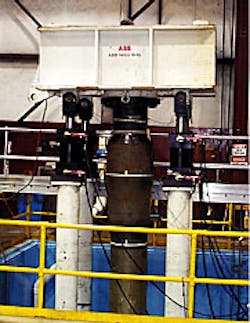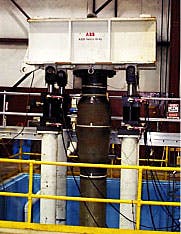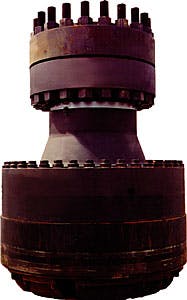Composite production riser system in fatigue testing
Optimizing multi-direction properties
These two photographs show ongoing riser and wellhead projects at ABB. Fig. 1) shows a 21-in. composite drilling riser main body tube undergoing cyclic testing. Fig. 2) is a photo of the SHD H-4 hydraulic subsea wellhead connector, which ABB says is intended for harsh environment, deepwater conditions.A research team at ABB Vetco Gray's facility in Houston is fatigue-testing a full-scale prototype of composite riser systems as part of a deepwater system development program. Other parts of the program include a harsh-environment deepwater wellhead system.
ABB says that making drilling equipment from composite materials eliminates the need for maintenance; another benefit is that it can be used by today's drilling vessels.
"As conventional drilling equipment becomes heavier in order to withstand increasing water depths, it also becomes increasingly difficult to handle," explains Gary Galle, Manager, Composite Technologies, Research and Development, in Houston. "By using composites, we can build equipment with the strength of steel, yet with half the weight. That means operators can drill and/or produce in twice as deep that is using existing vessels by simply replacing the risers.
"The true challenge is optimizing the strength properties of the composite. While steel has multi-directional strength properties, composites can be highly optimized due to their inherent directional properties. Directionality is an asset since most drilling components are only stressed in one or two directions. Composites can therefore be utilized to take advantage of directionality and further reduce a product's weight," Galle continued.
License agreement
Late last year, Northrop Grumman Corp. awarded ABB a technology license to further develop and commercially sell composite products for deepwater oil and gas exploration and production.It had already been working for three years with Northrop Grumman's Marine Systems unit on the development of large, lightweight, super-strong composite tubular structures for use as tethers and risers. Following the license agreement, ABB Vetco Gray has been working on carbon filament composites and specialized analysis tools. The company says that its Houston team is developing tools intended to continually optimize composite components to meet continually changing industry standards and customer requirements.
Wellhead enhancements
ABB Vetco Gray said that it is enhancing its MS-700trademark subsea wellhead systems with improved heavy duty connector systems for deep and ultradeepwater locations in harsh environment conditions. ABB said that the SHD-H4Registered Connector's qualities include:- Interchangeability with standard hydraulic components
- Field adaptability to fit standard profiles
- High ft/lb pressure capability
- Features to prevent hydrate formation by sealing out critical areas susceptible to methane migration.
Another enhancement project for the wellhead system includes advances in tooling, including:
- Isolation test tool
- Pressure-assist casing hanger running tool
- 8-in. and 30-in. cam actuated housing running tool
- Plug type test tool
- Wear bushing running and retrieval tool
- Drillpipe hanger running tool.
Copyright 1998 Oil & Gas Journal. All Rights Reserved.


